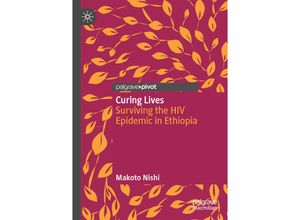This is a book about life during the HIV epidemic in Ethiopia and seeks to understand how and
why the global effort to achieve universal HIV treatment has shifted away from its initial
focus on the excessive human suffering precipitated by the epidemic. When antiretroviral drugs
became available in Ethiopia they emerged as powerful agents of change: not only did they cure
individuals they also helped people overcome their fear of - and break the silence around -
AIDS while healing the social ruptures caused by the epidemic. Nevertheless as this book
argues the very same agents have silently reversed these changes over the course of the past
decade. These reversals have dissolved connections re-incurred invisible social fissures and
allowed a large majority of people to stay indifferent to the suffering of individuals whose
lives remain vulnerable under the current treatment regime. This whole process is a product of
neoliberal global health interventions that determine whichlives are worthy or unworthy of
investment. This book will interest scholars of biopolitics and public health those who study
the developing world and those interested in how pandemic interventions alter the lives of
many.



